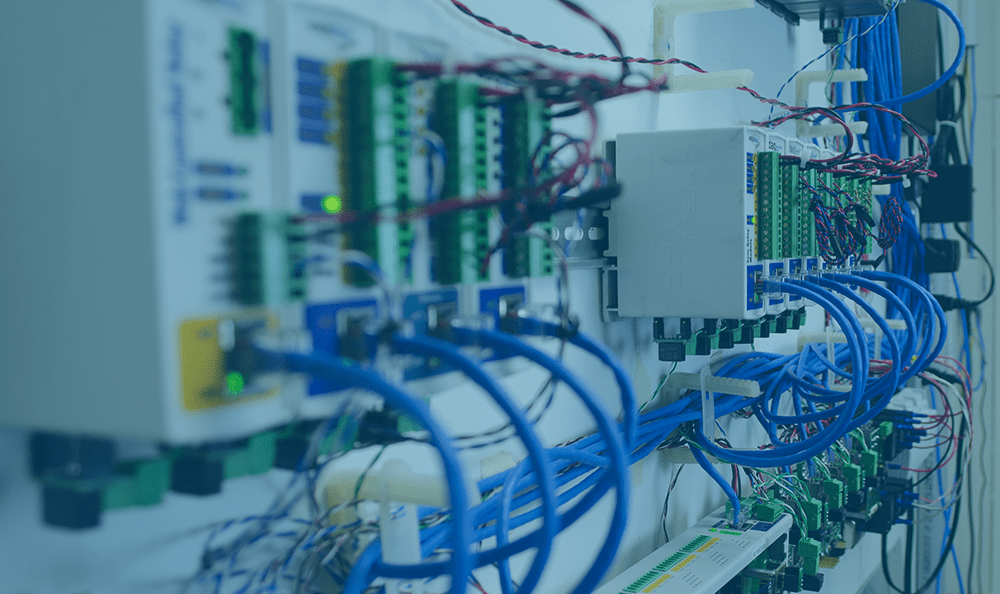Industry 4.0 has been in full swing for over a decade. In that time, new technologies have had a major impact on businesses and other organizations thanks to increasingly capable, interconnected networks of devices. This combination of hardware and software is called the Industrial Internet of Things (IIoT). There are a virtually unlimited number of use cases for IIoT—and just as many tools for the task.
Network-enabled controllers are a core component of IIoT. They bridge the gap between sensors and control systems, or SCADA software. Your options for controllers are as varied as the possible ways to use them. In this article, we’ll compare three types of controllers that vary in cost, complexity, and capability. (Other devices could be used, such as simple data gateways. But we’re focusing on logic-capable controllers at the edge.)
Comparing Logic-Capable Devices
There are a myriad of tools available for IIoT applications. The Raspberry Pi has emerged as a popular choice, particularly for DIY applications. It’s a compact, versatile single-board computer with an open platform. ControlByWeb® I/O controllers stand out as a more robust, feature-rich alternative, with reduced complexity and easier scalability. Traditional PLCs offer the most processing power of the bunch, with the caveat of a higher price and prerequisite programming knowledge.

Raspberry Pi: Cheap, Open, & Community-Driven
Raspberry Pi originated in 2012 in Cambridge as a way for young people to access programmable hardware. They’re small, cheap, durable devices, and are ubiquitous in classrooms around the world, supporting 26,000+ teachers.1 The Raspberry Pi OS, based on Linux, is a blank slate for development—as far from the drop-down menus on a ControlByWeb device as you can get. The open playground is popular with DIY tech enthusiasts and intrepid integrators.
Cost-Effective
One of the most significant advantages of the Raspberry Pi is its cost-effectiveness. Priced at a fraction of traditional industrial controllers, it makes IIoT solutions accessible to a broader range of users, including small businesses and startups with limited budgets. (Notably, ControlByWeb modules aren’t much more expensive and offer much of the same capability as PLCs running thousands of dollars.)
Very, Very Open
The Raspberry Pi supports a wide array of programming languages and operating systems, making it a highly flexible platform. Its GPIO (General Purpose Input/Output) pins provide ample opportunities for interfacing with various sensors and actuators. This openness is a double-edged sword in that you have to program everything yourself, from scratch.
Expansive Community
The extensive community support surrounding the Raspberry Pi is another boon. Thousands of tutorials, forums, and libraries are available to assist users at every level of expertise, ensuring that even those with limited technical knowledge can successfully implement projects.

ControlByWeb®: Easy to Use, Capable, & Scalable
ControlByWeb offers a “Goldilocks” solution that’s a happy medium between DIY and PLC—while being practically as affordable as a Raspberry Pi. We’re a bit biased, but our customers tend to agree:
“Ease of programming … compared to competitor PLCs.”
“I like the ease of programming and web interface compared to [competitor] PLCs I use … When I have an issue I can’t figure out, the technical staff has always steered me in the correct direction.”
Easy to Use
Installation, setup, system monitoring, and troubleshooting are all real costs of doing business. ControlByWeb devices are simple to integrate and use thanks to the embedded UI and Task Builder, where logic can be created using drop-down menus. Plus, you have the option to add a ControlByWeb Cloud seat for easy remote management, cloud data logging, and parent-child account management.
Integration & Scalability
ControlByWeb I/O controllers offer seamless integration with existing industrial systems. They support standard communication protocols such as Modbus, SNMP, and HTTP, allowing easy interoperability with other devices and systems. Additionally, they are highly scalable, enabling users to expand their IIoT solutions as their needs evolve.
Industrial-Grade Performance
Unlike the Raspberry Pi, which is more suited for prototyping and small-scale deployments, ControlByWeb I/O controllers deliver industrial-grade performance. They provide precise and accurate data acquisition real-time monitoring and control capabilities, making them ideal for critical applications where precision and reliability are paramount.
Great Support
From pre-purchase research to long-term support, ControlByWeb’s staff is a quick phone call or chat away. We also offer a best-in-class 5-year warranty, well over the industry standard of 1 year.
Determine the best products for your application with our Sales Engineers.

Traditional PLCs: Unmatched Processing Power
Where ControlByWeb provides compelling solutions for the broad range of industrial IoT applications, traditional programmable logic controllers “PLCs) remain the most capable option for complex and large-scale industrial systems. Despite a higher price tag and complexity, they’re unmatched in pure processing power.
The Most Capable
PLCs are designed to handle the most demanding industrial applications. They offer extensive I/O options, high-speed processing, and advanced control algorithms, making them suitable for tasks that require real-time decision-making and intricate control logic.
Extensive Ecosystem
The ecosystem surrounding PLCs is vast and well-established. Software tools ensure users can fully leverage the capabilities of their PLC system. Like ControlByWeb, manufacturers often provide comprehensive support.
Power for a Price
Investing in PLCs is a long-term commitment. They can run upwards of thousands—even tens of thousands—of dollars per unit. There’s also the hidden cost of complexity; someone with extensive programming knowledge will be needed for setup and system monitoring.
The ControlByWeb® Difference
The above is a high-level overview. There’s not necessarily a “right” way to capture edge data. Some applications need the processing power of a full PLC, while others could benefit from the simplicity and features of ControlByWeb modules. For help with your industrial application, get in touch with our team or schedule a 15-minute demo to get a feel for our devices.
Subscribe to Our Newsletter
Subscribe to Our Newsletter
Sign up for our newsletter to receive information regarding new products and exclusive offers.
Follow Us on Social
References
1. Collins, S. (2022, February 28). The life of Pi: Ten years of Raspberry Pi. University of Cambridge. https://www.cam.ac.uk/stories/raspberrypi



